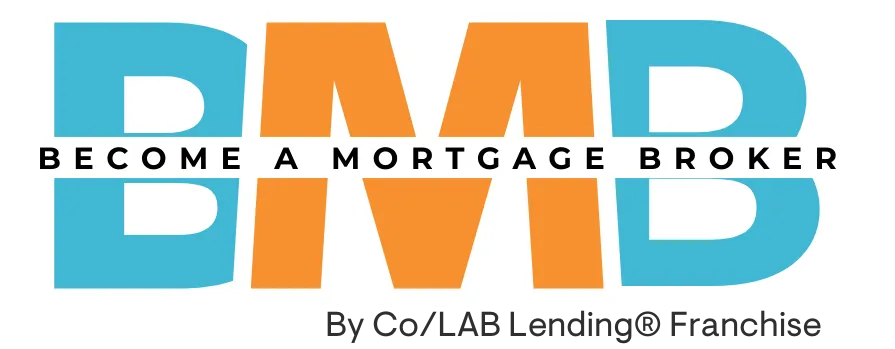You Know Real Estate.
We know Mortgage Business Success.
In today’s unpredictable market, relying solely on one income stream can be risky. But by adding a mortgage division to your real estate brokerage, you can diversify your revenue and safeguard your business. We specialize in helping real estate brokers launch and run profitable mortgage brokerages with ease.

Loan Options

Refinancing

How to Save
Real Estate Brokers.
Are you wondering about any of the following?
How can I increase earnings for my team?
Can I generate more income for my brokerage?
How do I elevate client satisfaction?
How can I add more value to my agents and clients?
Who can guide me to the right solutions?
If so, you’re in the right place! Take advantage of our expert resources—workbooks, templates, and training—or take a bold step forward by partnering with us to operate your own mortgage brokerage. Let’s help you enhance your real estate success today!!



THEY'RE SUPER HELPFUL
It’s the boring stuff that I don’t want to spend time on, the minutiae, but if you don’t handle it, it can really come back to bite you. They’ve spent time on that already and have systems, forms, and processes in place.
Sam Mauldin - Co/LAB Lending Franchisee, Owner


Discover What Your Real Estate Business is Missing
Explore new growth opportunities by scheduling a no-obligation call with us. Find out how integrating mortgage services could elevate your brokerage's income.
Discover What Your Real Estate Business is Missing
Explore new growth opportunities by scheduling a no-obligation call with us. Find out how integrating mortgage services could elevate your brokerage's income.

The Real Estate Industry is Facing Tough Challenges
You already know that making great money in a competitive real estate market requires precision. Profitability is harder to achieve with today’s challenges. But here's the good news—expanding your business by adding a mortgage brokerage allows you to build on your existing foundation, making it easier to grow without starting from scratch.
To thrive in the face of rising challenges, you need a strategy that fights back. Adding a mortgage brokerage as part of your growth plan helps you counter shrinking profit margins, low property inventory, and fierce competition. It’s not just about survival—it’s a proactive way to enhance profitability and customer retention.
Shrinking Profit Margins
Traditional commission structures are being squeezed, making it harder to stay profitable without new revenue streams.
Low Property Inventory
With fewer homes on the market, competition is fierce, and buyers are struggling to find options, reducing your potential sales volume.
Low-Cost vs. Traditional Brokerage Models
Low-cost brokerages are capturing market share by offering discounted services, further pressuring your margins, though often sacrificing long-term profitability.

What Are Your Options?
What are the options that add value to Customers & Your Business?
What can you do to add value to both your customers and your business? If you’re wondering how to grow your income in today’s market, consider adding an ancillary business to your real estate brokerage.
Traditionally, brokers relied on partnerships in subleases or shared marketing agreements, but these strategies have limits.
Ancillary businesses, however, offer uncapped income potential and diversify your revenue streams.
What can you do to add value to both your customers and your business? If you’re wondering how to grow your income in today’s market, consider adding an ancillary business to your brokerage.
Traditionally, brokers relied on partnerships in subleases or shared marketing agreements, but these strategies have limits.
Ancillary businesses, however, offer uncapped income potential and diversify your revenue streams.
Ancillary Businesses Add Convenience
Adding an ancillary business broadens your service offerings and improves the customer experience. For example:

Car Purchases
When buying a car, you might get financing, warranties, and services all in one place, making the experience seamless and convenient.

Doctor Visits
At a doctor’s office, you can often get lab work, x-rays, and other services in-house, adding to your convenience.
Now imagine if your real estate brokerage could offer the same level of service: your client writes an offer and meets with a loan officer, insurance agent, and title agent all in one place. This creates value, convenience, and new revenue streams for your business.
Simply put you add value, convenience, and created opportunity for your business.
Calculate Your Potential Earnings as A Mortgage Broker
Use our calculator to project how much revenue you could generate by integrating mortgage services into your real estate brokerage.
Calculate Your Potential Earnings as A Mortgage Broker
Use our calculator to project how much revenue you could generate by integrating mortgage services into your real estate brokerage.
Why Mortgage is the Best Ancillary Business for Real Estate
Mortgage services are a natural extension of your real estate business. Once a client finds a home, the next step is securing financing. By offering mortgage services, you not only provide more value to your clients, but you also gain access to additional revenue streams.
Plus, mortgage loans are not restricted by geography, allowing you to offer services even outside your local area.
Additionally, the Mortgage Broker model is less risky, because the wholesale lender takes on all responsibilities for underwriting and providing funds at closing.


Why Start a Mortgage Brokerage?
If you're a real estate professional, your clients are likely already working with one of these three types of lenders:

FDIC Bank
Local community banks that handle mortgages alongside other banking services.

Retail Lender or Correspondent
Larger institutions that focus solely on mortgages through loan officers.

Mortgage Broker
Locally owned businesses that help homebuyers secure financing through wholesale lenders.
If you're sending clients to one of these lenders, you're leaving money on the table. Why not capitalize on the business you already have by offering in-house mortgage services through your own mortgage brokerage? By keeping mortgage services under your roof, you not only create an additional revenue stream, but you also provide a more seamless experience for your clients—boosting satisfaction, retention, and referrals.
Opening a mortgage brokerage isn’t just a way to add value for your clients; it’s a powerful way to take control of your business growth and future-proof your income.
Don't Get Left Behind: Why You Need Mortgage Services
Industry leading resource, Housingwire.com has written many articles on the benefits of real estate professionals plugging into a mortgage company in the last few years. They have a great article called Mortgage Join Ventures May be a Lifeline in a Tough Market.
However, while joint ventures are one way to enter the mortgage space, starting your own mortgage brokerage can offer you more control, higher profitability, and greater long-term benefits.
Here are two common joint venture models that real estate professionals often explore:
The Lender Model Joint Venture
This model involves forming a partnership with a mortgage lender, but it comes with a hefty price tag—often requiring an initial investment of at least a million dollars. The overhead costs are high, as you’ll need to ensure your lending operation complies with all regulations. While this model can be profitable, it demands significant upfront capital and operational responsibility.The Broker Model Joint Venture
For those looking for a lower-cost entry into the mortgage industry, the broker model is a more accessible option. State regulations vary, but many require a minimum net worth of around $25,000 (compared to a million for lender JVs). Additionally, broker joint ventures rely on wholesale lenders to handle underwriting, reducing your operational burden and risk.
The costs are lower, and the partnership is often simpler to manage. Wholesale lenders take care of funding and compliance, giving you more flexibility and less liabilityWhile both joint venture models offer opportunities, many real estate brokers find that owning a mortgage brokerage outright is even more advantageous. After speaking with brokers who initially entered joint ventures, we’ve learned that many of them regret not going solo from the start. Here's why:
Control Over Decisions: In a joint venture, key business decisions, such as hiring or strategic direction, may be out of your hands.
Full Ownership of Profits: When you send clients to your mortgage brokerage, you want to keep 100% of the profits, not just a share.
Ability to Reward Agents: Owning your brokerage allows you to share profits with your real estate agents, improving recruitment and retention.
At Co/LAB, we’ve built a Plug & Play Franchise Model that combines the benefits of full ownership with the support you need to run a successful mortgage brokerage. You own 100% of the business and control every decision while leveraging our expertise and resources to streamline operations.


How Will Structure Your Mortgage Company?
And You Have Absolutely No Idea Where to Even Start!
When choosing to add an ancillary product or service to your business, there are a few ways that you can structure the management and setup of the business.
Branch at a Lender
Joint Ventures
Plug & Play Models (Franchise)
Branch at a Lender
This limits your control and income because only licensed loan officers can be paid.
Joint Ventures
While popular, this option reduces your control and profits.
Joint Ventures can be complicated and tricky. Partnering with a lender you risk losing future business should your partnership end.
If you send 100% of the business to your lender partner, do you want 50% of the profits? Of course not!
You do not have control over decisions such as hiring, or how money is spent.
Plug & Play Franchise Model
With a Plug & Play Franchise Model like Co/LAB, you own 100% of the mortgage business while receiving full support. You retain control, decide who you want to hire, and integrate the mortgage services seamlessly into your existing real estate business.
Your Path to Financial Freedom!
We believe Co/LAB Lending’s Mortgage Broker Franchise and Mortgage Broker Concierge Services are the key to financial freedom for real estate brokers looking to diversify their income and gain full control over their business.
Co/LAB Lending® is the only independent mortgage broker franchise model!




This website is operated by Co/LAB Lending® Franchise. To learn more visit our website at www.colablendingfranchise.com.
Copyright Co/LAB Lending® Franchise 2024 - All Rights Reserved
This website is operated by Co/LAB Lending® Franchise. To learn more visit our website at www.colablendingfranchise.com.
Copyright Co/LAB Lending® Franchise 2024 - All Rights Reserved





